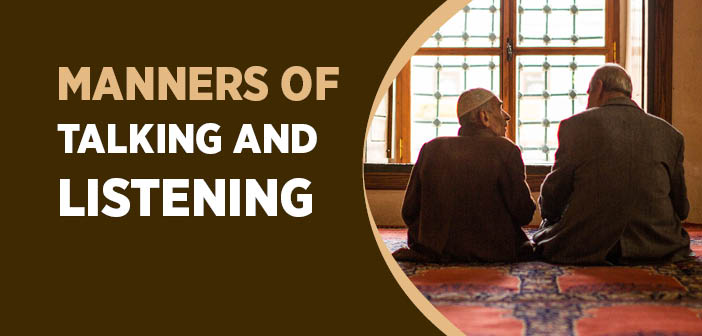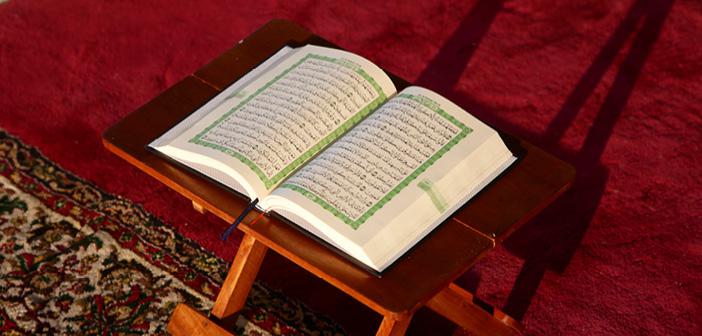
Manners of Talking And Listening
What is the etiquette of talking in islam? What is manners of dialogue in islam? What are the etiquettes of listening?
The manner of speaking in Islam:
- One should speak clearly and intelligibly according to the level of the addressee, and repeat the important points of the speech when necessary. As a matter of fact, the following points pointed out by the Companions about our Prophet, who spoke in a clear and eloquent style, are very important:
“The Messenger of Allah -upon him peace and blessings- spoke in a distinct manner so that anyone who listened to him could understand it.” (Abu Dawud, Adab, 18)
“The Prophet – upon him peace and blessings - used to talk so clearly that if somebody wanted to count the number of his words.” (al-Bukhari, Manaqib, 23)
“The Messenger of Allah – upon him peace and blessings - would repeat the words and phrases he wanted to be understood thoroughly three times.” (al-Tirmidhi, Manaqib, 9)
Sometimes it may be necessary to repeat the word so that it can be understood well by the addressee. For this reason, important issues in the Qur’an are repeated several times in different chapters. For example, Satan’s disobedience to the divine command and not prostrating was repeated in seven places, and the situation of magicians who believed in Moses was repeated in four places.
While the Messenger of Allah -upon him peace and blessings- was leading the prayer, he would sometimes repeat the remarkable verses two or three times. In like manner, while giving advice and warning to the Companions, he would repeat some statements. It is possible to come across such repetitions in the conversations of the friends of Allah as well. However, repetition should be for the purposes of indoctrination. It should not cause boredom and should be appropriate for the level of the community.
- It is strictly forbidden to make pretentious speeches with the intention of pedantry and to show oneself superior to others, or to address people with words that they cannot understand.
Now there is a kind of man whose views on the life of this world may please thee greatly, and [the more so as] he cites God as witness to what is in his heart and is, moreover, exceedingly skillful in argument. (al-Baqara, 2: 204)
Now when you see them, their outward appearance may please you; and when they speak, you are inclined to lend ear to what they say. [But though they may seem as sure of themselves] as if they were timbers [firmly] propped up, they think that every shout is [directed] against them. They are the [real] enemies [of all faith], so beware of them. [They deserve the imprecation,] “May Allah destroy them!” How perverted are their minds! (al-Munafiqun, 63: 4)
Our beloved Prophet -upon him peace and blessings- said:
“Allah, the Exalted, hates the eloquent one among men who moves his tongue round (among his teeth), as cattle do.” (Abu Dawud, Adab, 4987)
The Messenger of Allah never worried about the art in his speeches. Our beloved Prophet spoke with pure emotions, full of compassion and mercy, and with the most natural expressions of his soul.
- One should not speak loudly by shouting. It is not right for a person to shout as if he is talking to the deaf or to speak in an angry tone as if he is fighting. Adopting a polite and gentle style is always the most appropriate way of speaking. As stated in the Qur’an, Luqman -upon him peace- recommended the method in question to his son as follows.
“And (O my son!) be moderate in your pace, and lower your voice; for the harshest of sounds without doubt is the braying of the ass.” (Luqman, 31: 19)
When sending Musa and his brother Harun to Pharaoh, Allah wanted them to warn him with a gentle speaking, and ordered the use of a beautiful style as a matter of etiquette, even if the addressee is an unbeliever:
“Go, both of you, to Pharaoh, for he has indeed transgressed all bounds; But speak to him mildly; perchance he may take warning or fear (Allah).” (Ta Ha, 20: 43-44)
Kind words and the covering of faults are better than charity followed by injury. Allah is free of all wants, and He is Most-Forbearing. (al-Baqara, 2: 263)
- It is forbidden for two people to whisper among themselves, excluding the third person with them. The Messenger of Allah said:
“When you are three, do not let two of you whisper in front of the other until they mingle with other people, doing so may cause distress to the lonely person.”
“In most of their secret talks there is no good. However, secret conversations made by those who encourage giving alms, doing good or making peace between people are exempt from this. Whoever does this for the sake of Allah, We will certainly give him a great reward.” (al-Nisa, 4: 114)
- If any issue is being discussed in an assembly or if a question is asked to be answered, the right to talk first belongs to the elder of the assembly.
However, other people can also express their opinions in an appropriate manner if need be. As a matter of fact, when Abdurrahman bin Sahl, who is the youngest, first started to talk about an incident, our Prophet said; “Leave the word to the elders, leave the word to the elders!” Then the elders conveyed the story.
- One should speak concisely and avoid unnecessary details. In other words, it is necessary not to talk much, but to speak appropriately and in moderation. This is one of the characteristics of a believer.
“Those who turn away from vain talks and deeds.” (al-Mu’minun, 23: 3)
“But there are, among men, those who purchase idle tales, without knowledge (or meaning), to mislead (men) from the Path of Allah and throw ridicule (on the Path): for such there will be a Humiliating Penalty.” (Luqman, 31: 6)
The Prophet -upon him blessings and peace- said:
“Do not talk too much without remembering Allah! Saying too many words other than the remembrance of Allah hardens the heart. There is no doubt that those with hard hearts are the furthest from Allah.”
The Messenger of Allah -upon him blessings and peace- said:
“Every word of man is against him; except to enjoin good, forbid evil, or to remember Allah.”
The Messenger of Allah -upon him blessings and peace- said:
“It is because of the goodness of a Muslim that he abandons what does not (directly) concern him.”
- Speeches that do not have any material or moral benefit, on the contrary, are harmful, should be strictly avoided. Our Almighty Lord states:
“Not a word does he (or she) utter, but there is a watcher by him ready (to record it).” (Qaf, 50: 18)
- Saying “InshaAllah” when talking about the future is another etiquette related to speaking. To say “inshaAllah (If Allah wills)” when wishing for something for the future means to be aware of Allah’s will and not to recognize a will above His will. As a matter of fact, it is stated in the Qur’an:
“And never say of anything, “I shall do such and such thing tomorrow.” Except (with the saying), “If Allah wills!...” (al-Kahf, 18: 23-24)
Source; Islamic Etiquette, Faruk KANGER - Lokman HELVACI, Erkam Publications
Good Manners Towards Allah AlmightyGood Manners Towards Our Prophet











